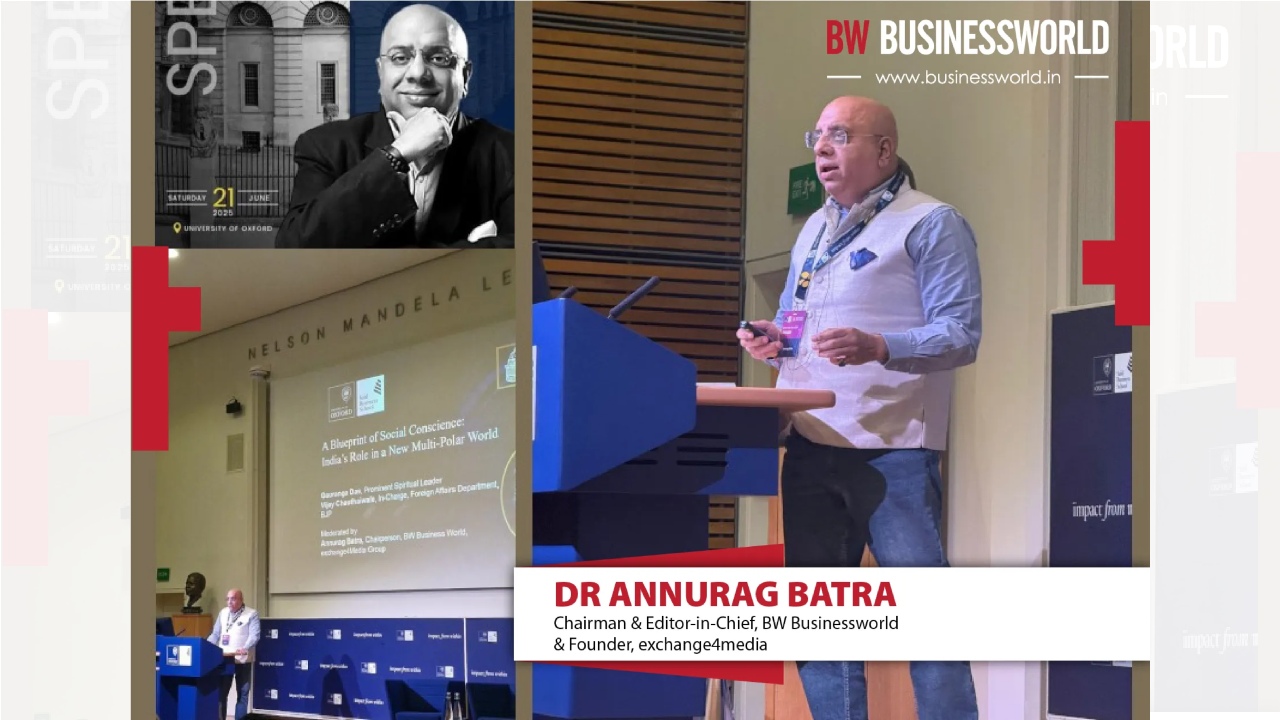On 21 June 2025, Annurag Batra, Chairman & Editor-in-Chief of BW Businessworld Media Group and Founder of exchange4media, took the stage at the University of Oxford’s Saïd Business School to deliver a message to the world — it is time to see India differently. Speaking at Oxford’s iconic Nelson Mandela Lecture Theatre during a special forum, Batra stood alongside prominent Indian voices, including spiritual leader Gauranga Das and BJP Foreign Affairs Department head Vijay Chauthaiwale.
Batra’s address, a stirring stand on India’s place in the new world order, blended sharp geopolitical insight, cultural commentary, and personal storytelling, punctuated with a symbolic invitation to the audience to “smell the chai”. This wasn’t just about tea, he clarified, but about tuning into the rich, pluralistic essence of modern India.
India’s Confident Stride On The World Stage
Opening with nostalgic imagery of sipping chai in Delhi with his parents, Batra made a compelling case for India’s transformation from a polite observer in global affairs to a confident influencer rewriting the rules. “India is no more a shy kid at a global party,” he said, referencing Prime Minister Modi’s growing prominence on multilateral platforms, including the G7, where world leaders now actively seek India’s perspective.
From deft diplomacy with global powers to strategic defence initiatives like Operation Sindoor, Batra illustrated how India today balances strength with statesmanship. “India struts onto the world stage with the confidence of a nation that knows its worth,” he said, striking a chord with the audience.
Calling Out Media Myopia
Batra did not hesitate to call out the global media’s limited framing of India. Drawing from personal interactions with figures like CNN’s Riz Khan and BBC’s Tim Sebastian, he acknowledged his admiration for Western journalism but took issue with its reductive portrayals. “India’s diplomatic finesse deserves more than reductive soundbites,” he said, calling out international outlets for focusing on India’s challenges while ignoring its achievements.
In his characteristically candid style, Batra referenced his earlier column, ‘Hello CNN, BBC And The World Media – Time To Tune Into India’, reinforcing his plea for a more nuanced global media narrative around India.
A Blueprint Rooted In Self-Belief
Batra’s speech was not only a critique of the outside gaze but a celebration of India’s internal transformation. He highlighted India’s vaccine success during the Covid-19 pandemic, its global fintech leadership through UPI, and the growing pride in institutions like IITs. “Our pluralism, Hindus, Muslims, Sikhs, Christians sharing chai at roadside stalls, is our heartbeat,” he noted.
He also called out the irony of global news headlines that praised India’s vaccine efforts with caveats like “millions yet to receive a single dose” while ignoring the magnitude and pace of the country’s public health rollout. For Batra, India’s ability to act swiftly and inclusively in the face of crisis is emblematic of a new India, one that solves its problems and contributes solutions to the world.
Soft Power That Speaks Without Shouting
In a clear pivot from hard power to heart power, Batra delved into India’s soft power, a blend of culture, diaspora, and civilisational values. From International Yoga Day to the global embrace of Bollywood and Indian festivals, he described how India builds bridges rather than borders.
“Our 32-million-strong diaspora is our global chaiwallah,” Batra said with a smile, highlighting the cultural diplomacy led by Indians across continents, from Silicon Valley boardrooms to British politics. This, he argued, is India’s true strategic edge of influence without imposition.
India’s ‘No’ Is Also A Strategy
Batra’s narrative wasn’t one of blind optimism but of intentional strategy. He lauded India’s refusal to accept lopsided trade deals, its assertive stance in regional conflicts, and its independent multilateral alignment policy, engaging the US, Russia, and China without compromising sovereignty.
“India said, ‘Thanks, but no thanks,’” he said, describing how India declined a recent trade deal that didn’t serve its long-term interest. From rejecting mediation in the India-Pakistan conflict to asserting its peace plans, Batra described a nation in charge of its narrative.
A Call To Reframe India
Concluding with the central metaphor of his speech, Batra invited the Oxford audience, and the world, to “smell the chai, not the coffee”. It was a call to move beyond old biases, clichés, and assumptions about India. “India’s not just a nation, it’s a vibe, a Vishwaguru guiding the globe,” he said.
Through deeply personal anecdotes, sharp data points, and global context, Batra framed India not as an emerging player but as an emerging model marked by democracy, pluralism, confidence, and compassion.
“Raise your cups to a nation that doesn’t just brew chai but brews a new global story,” he said, ending with a heartfelt “Namaste”.
A Forum of Significance
The panel, hosted at Oxford’s Saïd Business School and moderated by Batra himself, reflected on the growing international interest in India’s place in a multipolar world. With leaders like Gauranga Das and Vijay Chauthaiwale contributing perspectives on India’s social and strategic conscience, the discussion placed India’s civilisational values and political realities at the centre of global discourse.


